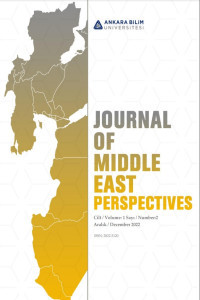Kamu Diplomasisi ve Yumuşak Güç Bağlamında İnanç Diplomasisi: İran ve Suudi Arabistan Örneği
Kamu diplomasisi, bir başka ülkede kamuoyu oluşturma maksadı ile sahip oldukları kültür, dil, din, ekonomi, sinema, spor gibi değerleri politik cazibe unsuru haline getirmeyi amaçlamaktadır. İnanç unsuru ise sahip olduğu değerler bağlamında kamu diplomasisinin bir parçası olarak değerlendirilmektedir. Bu değerler bağlamında din olgusu, din ve dine ait kavramların dış politikada etkin bir konuma sahip olduğu ülkelerde bir güç unsuru olarak kullanılmaktadır. Din temelli bu etkileşim bazen farklı dinler arasında gerçekleşirken bazen de Vahhabi anlayışa sahip Suudi Arabistan ve Şii anlayışa sahip İran örneğinde olduğu gibi aynı din içerisinde mezhep temelli yapılmaktadır. Dolayısı ile inanç kavramı teolojik epistemolojisinden zaman zaman ayrılarak ideoloji ve politik dinamikler çerçevesinde bir güç unsuru olarak kullanılabilmektedir. Bu makalede inanç diplomasisinin kamu diplomasisi içindeki etki/etkinliğini Suudi Arabistan ve İran örnekleri üzerinden ele alınarak incelenmiştir. Din kavramını mezhepsel politika unsuru olarak ele alan her iki ülke kendilerine biçtikleri hamilik rolü ile benimsemiş oldukları inanç sistemini toprakları dışına ihraç ederek nüfuzunu arttırma yoluna gitmiştir.
Public Diplomacy and Faith Diplomacy in the Context of Soft Power: The Case of Iran and Saudi Arabia
Public diplomacy aims to make the values such as culture, language, religion, economy, cinema, sports, etc., into a political attraction in order to create public opinion in another country. The phenomenon of religion is also considered as a part of public diplomacy in the context of its values. In this context, the phenomenon of religion is used as a power factor in countries where religion and religious concepts have an effective position in foreign policy. While this religion-based interaction sometimes takes place between different religions, sometimes it is sectarian-based within the same religion, as in the case of Saudi Arabia with a Wahhabi understanding and Iran with a Shiite understanding. Therefore, the concept of religion can be separated from the theological epistemology from time to time and used as an element of power within the framework of ideology and political dynamics. This article examines the effect/effectiveness of faith diplomacy in public diplomacy by considering the examples of Saudi Arabia and Iran. Both countries, which consider the concept of religion as a sectarian policy element, seek to increase their influence by exporting the belief system they have adopted out of their lands, with the patronage role they have set for themselves.
